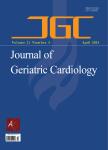Obstructive sleep apnea is associated with severity and long-term prognosis of acute coronary syndrome
Obstructive sleep apnea is associated with severity and long-term prognosis of acute coronary syndrome作者机构:Bejing Anzhen Hospital Capital Medical University Beijing Institute of Heart Lung and Blood Vessel Disease Beijing China
出 版 物:《Journal of Geriatric Cardiology》 (老年心脏病学杂志(英文版))
年 卷 期:2018年第15卷第2期
页 面:146-152页
核心收录:
学科分类:090603[农学-临床兽医学] 0832[工学-食品科学与工程(可授工学、农学学位)] 08[工学] 09[农学] 0906[农学-兽医学] 083203[工学-农产品加工及贮藏工程]
基 金:This work were supported by the grant from National Key Research and Development Program of China (2017 YFC0908800) the Beijing Municipal Administration of Hospitals Clinical Medicine Development of Special Funding Support (code: ZYLX201303) the National Key Clinical speciality Construction Project (2013-2014) and the "Beijing Municipal Administration of Hospitals" Ascent Plan (code: DFL20150601)
主 题:Coronary angiogram Coronary artery disease Obstructive sleep apnea Outcomes
摘 要:Background Obstructive sleep apnea (OSA) is a common disease in patients with acute coronary syndrome (ACS) and associated with an increased risk of fatal and nonfatal cardiovascular events. However, most patients in previous study were treated with bare metal stents and the sample sizes were relatively low. The goal of this study was to evaluate the influence of OSA on the severity and prognosis of patients admitted for ACS. Methods In this prospective cohort study, we enrolled patients with ACS who were hospitalized for coronary angiogram/percutaneous coronary intervention and undergone polysomnography. We divided the patients into two groups: moderate to severe OSA group [apnea-hypopnea index (AHI) 〉 15 events/h] and control group (AHI ≤ 15 events/h). They were followed up for up 32 months. Then, we compared the ACS severity and long-term major adverse cardiovascular events (MACE) in patients with different severity of OSA. Results Five hundred and twenty nine patients were included in the final analysis, with 76% of them being men and an average age of 59 + 10 years. The overall mean AHI is 29 ± 19 events/h, 70.5% of them (373/529) being with moderate to severe OSA and 29.5% (156/529) assign into control group. Compared with controls, patients with moderate or severe OSA exhibited a higher prevalence of hypertension as well as higher body mass index, SYNTAX score, Epworth score and length of hospitalization. With a median follow-up duration of 30 months, accumulative rate of MACE was also higher in patients with moderate or severe OSA than that in the control group (8.6% vs. 3.2%, P = 0.028). After adjusting for baseline confounders by cox regression model, moderate to severe OSA was an independent risk factor of long-term MACE (P = 0.047, HR = 1.618, 95% CI: 1.069-3.869). Conclusions The results of this study demonstrate that moderate or severe OSA is correlated with disease severity and associated with worse long-term prognosis in ACS patients. The results rai



